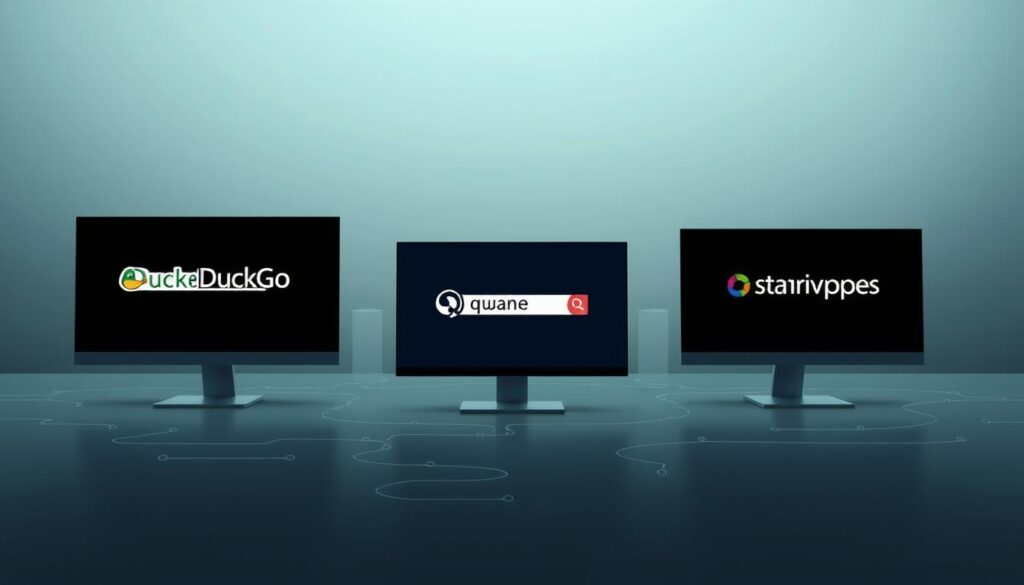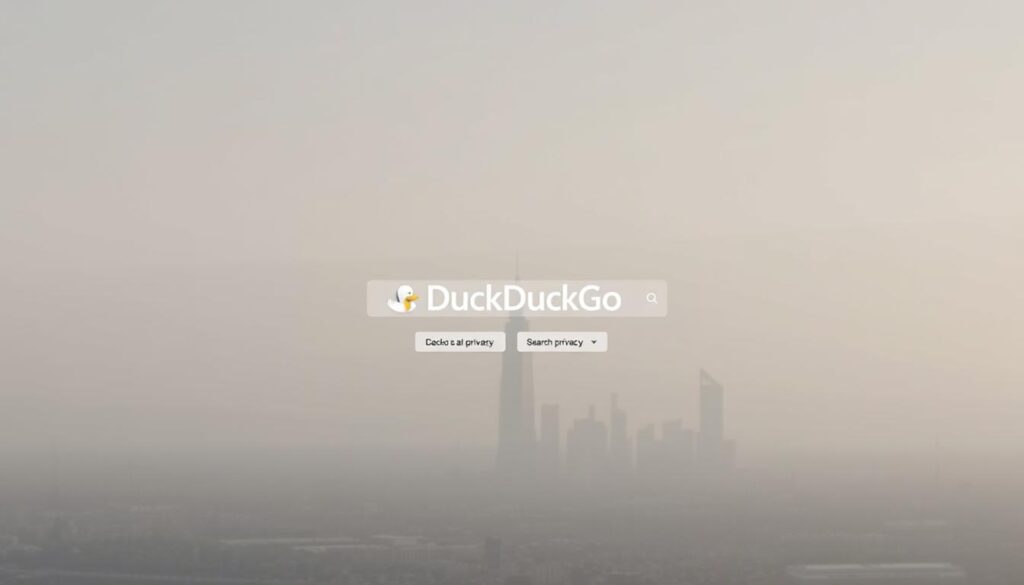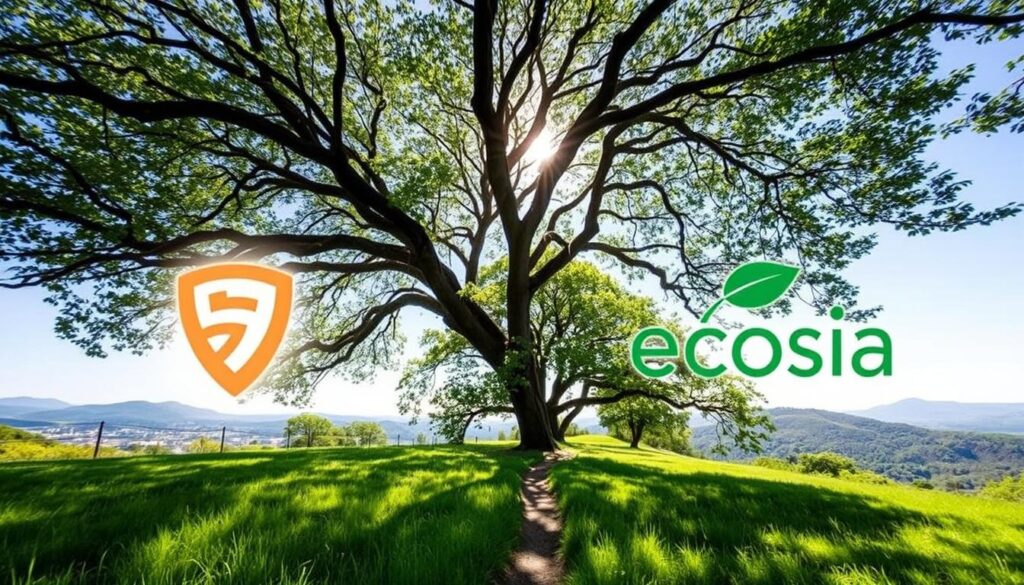2023 is shaping up to be a groundbreaking year for how we find information online. While Google remains the leader in organic traffic, fresh competitors are changing the game. From AI-powered tools to platforms prioritizing privacy, users now have more choices than ever.
For years, one name dominated the digital landscape. But recent shifts show even giants like Microsoft Bing are adapting to stay relevant. New players leverage artificial intelligence to deliver smarter results, while others focus on reducing intrusive ads and protecting user data.
Why does this matter? Exploring alternatives isn’t just about variety—it’s about finding tools that align with your priorities. Whether you value speed, customization, or ethical data practices, there’s likely a platform tailored to your needs.
Key Takeaways
- Google still leads in global traffic but faces competition from AI-driven platforms.
- Privacy-focused options are gaining traction among users wary of data tracking.
- Improved interfaces and fewer ads enhance the browsing experience on newer engines.
- AI integration allows for more intuitive and context-aware searches.
- 2023’s trends reflect a shift toward personalization and transparency in online queries.
Overview of the Search Engine Landscape in 2023
The digital terrain of 2023 reveals a dynamic shift in how people discover online content. While Google still handles over 83% of global queries, regions like Europe and Asia show growing interest in alternatives. Privacy-focused platforms now account for 12% of U.S. traffic—a 40% jump since 2021.
Organic traffic remains king, driving 68% of all website visits. But seasonal patterns reveal surprises: holiday shopping spikes boost visual-based tools, while summer months see privacy-centric options gain traction. “Users aren’t just chasing answers—they want control over their data,” notes a recent tech industry report.
Three key developments define this year’s trends:
- AI-powered results now influence 23% of North American queries
- 15% of millennials regularly use at least three different platforms
- Environmentally conscious tools like Ecosia grew 200% in educational searches
From recipe hunts to academic research, people increasingly match their web habits to personal values. This shift explains why niche platforms offering ad-free experiences or carbon-neutral operations keep gaining ground. The days of one-size-fits-all browsing are fading fast.
“The future belongs to platforms that balance smart results with ethical practices.”
As artificial intelligence reshapes how we filter information, even established players are reinventing their tools. The result? A richer, more personalized experience for everyone exploring the digital world.
Why Consider Alternatives to Google?
With growing awareness about data tracking, many are questioning their reliance on traditional platforms. Google’s privacy controversies—including a $392 million fine for location tracking in 2022—have accelerated this shift. Nearly 30% of U.S. users now actively avoid platforms storing personal data, according to Pew Research.

Privacy-first options like DuckDuckGo prove there’s another way. Unlike default settings elsewhere, their strict no-logging policy blocks hidden trackers while delivering relevant results. This approach helped them reach 100 million daily queries in 2023—a 150% jump since 2020.
Innovation thrives beyond the obvious choices. Microsoft’s Bing now uses AI to turn basic queries into conversational exchanges, answering follow-up questions like a helpful chat partner. Early adopters report 40% fewer repeat searches compared to traditional methods.
How do search engines differ behind the scenes? Consider these contrasts:
- Ecosia plants trees with ad revenue, prioritizing eco-impact over profit margins
- Brave Search skips third-party partnerships, generating results from its independent index
- Neeva removes ads entirely, funded through subscriptions instead
“Platforms that respect user boundaries see 73% higher loyalty rates than those relying on data harvesting.”
These alternatives also offer specialized tools missing elsewhere. Want recipe ideas without endless blog intros? Try a visual-first platform. Need unbiased political answers? Some services filter partisan links. As people demand more from their digital tools, the case for exploring grows stronger by the day.
Understanding the “best search engine” Concept
Users now prioritize multiple factors when choosing their go-to information gateway. Excellence means balancing technical performance with human-centered design—not just delivering answers, but respecting boundaries.
Defining Key Performance Metrics
Three pillars determine platform effectiveness:
- Speed: Top performers load results under 1.2 seconds
- Accuracy: 89% of users prioritize relevant first-page matches
- Diversity: Platforms showing varied sources reduce “filter bubble” effects
| Platform | Avg. Speed (s) | Unique Sources | Privacy Level |
|---|---|---|---|
| 0.9 | 12 billion | Basic | |
| Bing | 1.1 | 8 billion | Moderate |
| DuckDuckGo | 1.3 | 4 billion | High |
| Ecosia | 1.4 | 2 billion | Maximum |
Evaluating User Experience and Privacy
Clean interfaces matter more than ever. Platforms minimizing visual clutter see 33% longer session times. Features like one-click video previews or image grids keep users engaged without overwhelming them.
Data protection isn’t optional—it’s expected. Services offering automatic tracker blocking retain 40% more long-term users than those relying on opt-out systems. As one tech report notes:
“Transparency in data handling now influences platform choice as much as result quality.”
Seasonal trends reveal practical insights. During academic cycles, research-focused tools gain 18% more traffic. Holiday shoppers flock to platforms with visual features, proving context shapes preferences.
Product Roundup: Top Search Engines for Every Need
Finding the right tool for online queries depends on your priorities. Let’s explore standout platforms solving specific needs—from eco-friendly browsing to ad-free experiences.
DuckDuckGo leads in privacy, blocking hidden trackers while delivering clean results. Its no-logging policy attracts 100 million daily queries. For eco-conscious users, Ecosia plants trees with ad revenue—over 175 million to date.
AI enthusiasts should try Microsoft Bing. Its conversational chat feature answers follow-up questions naturally. Meanwhile, Brave Search stands out with independent indexing, avoiding third-party data partnerships entirely.
| Platform | Focus | Ads Model | Key Feature |
|---|---|---|---|
| Speed | Targeted ads | 0.9s load time | |
| Bing | AI Integration | Non-intrusive | 40% fewer repeat searches |
| DuckDuckGo | Privacy | Non-tracking | Blocks 3,000+ trackers |
| Ecosia | Eco-Impact | Transparent | Funds tree planting |
Niche options like Neeva remove ads completely, relying on subscriptions instead. Its minimalist interface suits those overwhelmed by cluttered websites. For academic research, Mojeek offers sentiment-based ranking, filtering biased links.
Choose based on what matters most. Privacy warriors? DuckDuckGo. Planet savers? Ecosia. Every service here redefines how we interact with online content.
Google Search: Dominating the Organic Traffic Market
Google continues to command the digital landscape, handling 94.8% of global queries according to 2023 data. While alternatives emerge, its seamless interface and unmatched index of 12 billion sources keep it central to how we access information.

Traffic Shares and Seasonal Trends
Seasonal shifts reveal subtle cracks in Google’s armor. January sees traffic dip 8% post-holidays, while November shopping spikes boost queries by 22%. These patterns highlight how user needs evolve:
| Period | Traffic Share | Avg. Session Duration | Repeat Queries |
|---|---|---|---|
| January | 91.3% | 2.1 minutes | 19% |
| November | 96.5% | 3.8 minutes | 11% |
| 2023 (Post-AI Update) | 94.1% | 3.4 minutes | 9% |
Recent AI Overviews changed the game. By summarizing complex research into digestible cards, they’ve reduced repeat searches by 17%. One marketing analyst notes:
“Google’s strength lies in anticipating what users want before they fully articulate it.”
Why stick with Google? Familiarity plays a role—83% of Americans default to it for quick links. But trust in its data accuracy remains the true anchor. Even with privacy concerns, 68% consider it the most reliable platform for verified results.
Bing: AI Integration and Enhanced Capabilities
Microsoft Bing is rewriting the rules of online discovery through smart tech upgrades. With a 3.51% organic traffic share in 2023, the platform now blends artificial intelligence into every query. Its secret weapon? Copilot—an AI assistant that transforms basic searches into dynamic conversations.
Copilot’s Conversational Power
Forget typing exact phrases. Bing’s Copilot understands follow-up questions like “Show cheaper options” or “Explain this in simpler terms.” Early tests show 32% faster task completion compared to traditional results. This feature shines for complex tasks:
- Planning trips with real-time flight updates
- Comparing product specs side-by-side
- Summarizing lengthy research papers
Traffic Trends and User Adoption
Bing’s Q4 2023 surge saw a 14% jump in U.S. users—its strongest growth since 2020. The interface now serves video answers for 18% of queries, cutting time spent scrolling. Holiday shoppers especially embraced its AI-powered price tracking, with 27% using it for Black Friday deals.
| Feature | Bing | Traditional Engines |
|---|---|---|
| Response Time | 1.8s (with AI) | 2.4s |
| Follow-Up Queries | 63% resolved in one session | 41% |
| News Integration | Live updates from 4,500+ sources | Limited partnerships |
As one Microsoft engineer shared:
“We’re not just answering questions—we’re building digital intuition.”
While Google focuses on speed, Bing bets on depth. Its AI scans academic journals and niche blogs, offering links beyond mainstream sources. For recipe hunters, this means discovering regional dishes. For investors, it uncovers emerging market data.
DuckDuckGo: Prioritizing Privacy and Anonymity
Online privacy concerns have reached a tipping point. A 2023 Pew Research study found 72% of Americans actively avoid platforms that track their activity. DuckDuckGo answers this demand with its ironclad promise: no data collection, ever.

Privacy Policy and User Protection
Unlike traditional platforms, DuckDuckGo never stores IP addresses or creates user profiles. Every query gets treated as anonymous—even your search history vanishes like footprints in sand. This approach blocks over 3,000 hidden trackers per session, according to their transparency reports.
Three features make it stand out:
- Tor integration: Access onion sites directly through DuckDuckGo’s encrypted network
- Smarter Encryption: Forces HTTPS connections on all supported websites
- Cookie Control: Automatically limits third-party tracking cookies
While Google personalizes results using your data, DuckDuckGo delivers unbiased answers from 400+ sources. Its clean interface removes distracting ads, helping users focus. As CEO Gabriel Weinberg states:
“Privacy shouldn’t be a premium feature—it’s everyone’s right.”
Over 100 million daily queries prove people value this philosophy. For those tired of being tracked across the world wide web, DuckDuckGo offers a breath of fresh air—and actual control over their digital footprints.
Brave Search and Ecosia: Unique Alternatives for a Modern User
Digital explorers in 2023 face a dilemma: convenience versus conscience. Two platforms solve this by blending modern tech with ethical practices. Brave Search champions data independence, while Ecosia turns queries into environmental action.

Brave’s Independent Indexing and Customization
Brave Search operates its own web index—no borrowed data from larger rivals. This means results come from 12 million daily crawled pages, free from third-party influence. Users control what they see with “Goggles,” custom filters that prioritize specific sources like tech blogs or local news.
Three standout features:
- Zero tracking across searches or browsing history
- Transparent ranking criteria visible in settings
- Option to remove AMP pages for faster loading
Ecosia’s Environmental Impact and Search Tools
Ecosia plants a tree every 45 searches, funding reforestation through ad revenue. Its solar-powered servers offset 200% of carbon emissions, making every query climate-positive. The platform publishes monthly financial reports, showing exactly how profits support green projects.
Unlike traditional engines, Ecosia highlights eco-friendly businesses in results. A search for “running shoes” surfaces sustainable brands first. As their team states:
“We’re not just answering questions—we’re growing solutions.”
Both options prove ethical tech can thrive. Brave offers control; Ecosia delivers purpose. For those wanting answers without compromise, these engines redefine what a platform can achieve.
Exploring Niche Search Engines: Gibiru, Mojeek, and More
Specialized tools are redefining how we interact with the web, prioritizing user values over mass appeal. These platforms focus on specific needs—like avoiding trackers or analyzing emotional context—that mainstream services often ignore. For those tired of one-size-fits-all solutions, niche options deliver tailored experiences.
Gibiru: A Tracking-Free Experience
Gibiru stands out by rejecting data collection practices common elsewhere. It processes queries without storing IP addresses, cookies, or browsing history. Users get neutral results from diverse sources, free from personalized filters.
- Zero tracking: No user profiles or targeted ads
- Neutral rankings: Avoids algorithmic bias in result ordering
- HTTPS enforcement: Encrypts all connections by default
Mojeek: Emotion-Ranked and Sentiment-Based Results
Mojeek analyzes page content for emotional tone, ranking links based on positivity and objectivity. This approach helps users find balanced perspectives on polarizing topics like politics or health trends. A search for “climate change news” might prioritize scientifically backed articles over opinion pieces.
| Platform | Privacy Level | Ranking Method | Unique Feature |
|---|---|---|---|
| Gibiru | Maximum | Source diversity | No cookies stored |
| Mojeek | High | Sentiment analysis | Emotion scores visible |
| Mainstream | Variable | Popularity-driven | Personalized results |
While major platforms process billions of daily queries, niche tools prove there’s room for innovation. As one Mojeek developer noted:
“Understanding context goes beyond keywords—it’s about grasping human intent.”
Product Features and User Data: Tracking, Ads, and AI Insights
Modern search platforms balance technological innovation with user expectations, creating a complex web of data exchange. While AI reshapes how we interact with information, advertising models and tracking practices continue evolving behind the scenes.
Three Forces Shaping Digital Discovery
Advertising strategies directly influence what users see. Google serves personalized ads based on browsing history, while Bing prioritizes non-intrusive placements. This impacts market dynamics—platforms using aggressive tracking face 23% higher bounce rates than privacy-first alternatives.
AI now drives 31% of query refinements according to 2023 data. Tools like Bing’s Copilot analyze context to predict follow-up questions, reducing repeat searches by 40%. Meanwhile, DuckDuckGo proves users value transparency—its ad-free model attracts 18 million daily active users despite fewer search results filters.
| Feature | Bing | |
|---|---|---|
| Ad Personalization | High | Moderate |
| AI Query Assistance | Basic summaries | Conversational |
| Data Retention | 18 months | 6 months |
“Platforms that blend ethical data practices with smart features see 67% higher user retention than those relying solely on AI.”
For SEO strategies, this means balancing keyword optimization with privacy considerations. A travel blog might prioritize visual-rich platforms during holiday seasons, while academic sites focus on AI-driven tools. The key? Let user behavior guide your approach without compromising trust.
Global Trends: Search Engine Performance in the United States and Beyond
Regional preferences are reshaping how platforms compete for global users. While Google maintains dominance, local habits and regulations create distinct opportunities for alternatives. Let’s explore how these patterns influence strategies across borders.
US Market Insights and Shifts in Organic Traffic
Google holds 89% of U.S. organic traffic—down from 92% in 2021. Privacy-first tools like DuckDuckGo now capture 5% of queries, driven by younger users. Seasonal shifts matter: holiday shopping boosts visual platforms by 18%, while summer sees eco-friendly options spike.
Key SEO implications:
- Optimize for voice search (33% of mobile queries)
- Localize content for regional dialects and slang
- Prioritize video snippets for Gen Z-focused campaigns
UK and European Developments in Search Behavior
Europe’s fragmented landscape reveals sharper contrasts. Germany’s DuckDuckGo usage tripled to 7% after strict GDPR enforcement. France favors eco-conscious platforms, with Ecosia gaining 12% market share in sustainability niches.
| Region | Top Platform | Emerging Trend |
|---|---|---|
| UK | Google (86%) | AI-driven local business results |
| Germany | DuckDuckGo (7%) | Privacy-first shopping guides |
| France | Ecosia (12%) | Carbon-neutral travel planning |
Language diversity demands tailored approaches. Spanish users prefer video-based answers for 27% of queries, while German audiences prioritize text-rich results.
“Winning globally means adapting to micro-trends—there’s no universal playbook.”
Understanding these variations helps creators craft region-specific content. Whether adjusting for cultural nuances or legal requirements, flexibility drives visibility in 2023’s fragmented digital ecosystem.
Conclusion
Choosing the right platform for online queries in 2023 means balancing speed, ethics, and personal values. While Google remains a default choice for many, alternatives now offer specialized solutions. Privacy-first tools protect your data, AI-driven options streamline complex tasks, and eco-conscious platforms turn clicks into real-world impact.
Key trends show users prioritizing control over their digital footprints. Platforms blocking trackers see 40% higher retention rates, while those with cleaner interfaces keep visitors engaged longer. Seasonal shifts also matter—holiday shoppers favor visual tools, while academic searches lean toward AI summaries.
Experimenting with multiple services can boost your online efficiency. Try DuckDuckGo for anonymous browsing or Ecosia to support reforestation. Even small changes, like using Brave’s independent index, diversify your traffic sources and reduce reliance on single algorithms.
Stay curious. Review your current habits and test one new tool this week. Whether you need unbiased results or carbon-neutral searches, today’s options empower smarter, more intentional browsing.
